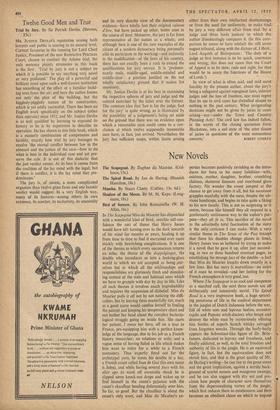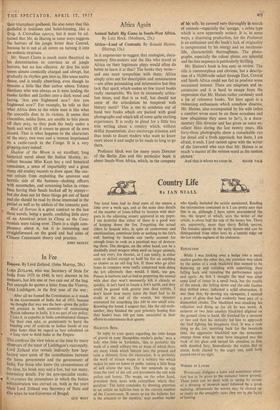New Novels
Mamba. By Stuart Cloete. (Collins, 13s. 6d.) IN The Scapegoat Miss du Maurier has dispatched with a -wonderful kind of brisk, sensible self-con- fidence the sort of theme that Henry James would have left turning over in the dark inwards of his mind for months or years, hauling it up from time to time to find it encrusted ever more thickly with bewitching complications. It is one of the themes to which every unconscious returns an echo, the theme of the doppelganger, the double who introduces us into a looking-glass world in which we are accepted as being our- selves but in which all the relLonships and responsibilities are gloriously fresh and stimulat- ing instead of the stale and habitual ones which we have to grapple with day by day in life. Like all such themes it involves much improbability and requires the suspension of disbelief. Miss du Maurier pulls it off not by not noticing the diffi- culties, but by leaving them masterfully out, much as a good nurse would confine herself to feeding the patient and keeping his temperature chart and not bother her head about the complex bacterio- logical struggle going on inside him. She starts her patient, I mean her hero, off on a tour in France, pre-equipping him with a perfect know- ledge of the language, due to his job as a French history researcher; no relations or wife; and a vague sense of having failed in life which makes him want to retire for a while to a French monastery. Thus expertly fitted out for the archetypal yarn, he meets his double in a bar, a French count called Jean de Gu6 (his own name is John), and while having several fines with his alter ego to ward off excusable shock he is slipped some knock-out drops and wakes up to find himself in the count's pyjamas with the count's chauffeur bending deferentially over him. So far, so good. But the chauffeur is about the count's only asset, and Miss du Maufier's ex-
pertise becomes positively ravishing as she intro- duces her hero to his many liabilities—wife, mistress, mother, daughter, brother, crumbling château, shattered finances and moribund glass factory. No wonder the count jumped at the chance to get away from it all, but his successor grapples manfully with the mess, despite the ob- vious handicaps, and begins to take quite a liking to his new family. This is not so surprising as it seems, because like himself they all respond in a gentlemanly untiresome way to the author's pur- pose—they all fit in. This sacrifice of the novel to the admittedly total fascination of the story is the only criticism I can make. With a very similar theme in The Sense of the Past (except that there his doubles change places in time), Henry James was so bothered by trying to make it a novel that he gave it up, after just succeed- ing, in two or three hundred resonant pages, in establishing the strange fact of the double—a fact that Miss du Maurier knocks down smartly in a few lines. But her story is marvellous—no more of it must be revealed—and her feeling for the French atmosphere is very good, too.
Where The Scapegoat is as cool and competent as a starched cuff, the next three novels are all deliberately and intensively torrid. The Spiral Road is a very impressive book, a huge sprawl- ing panorama of life in the medical department in the jungles of Dutch Indonesia before the war, full of white ants and leprous bodies, eccentric rajahs and Papuan witch-doctors who tempt and destroy the white man by mysteriously offering him bottles of superb Scotch whisky salvaged from forgotten wrecks. Through the hurly-burly appears the Schweitzer-like figure of Dr. Brits- Jansen, dedicated to leprosy and frambesia, and finally addicted, as well, to the total freedom and authority of life in the jungle. He is an equivocal figure, in fact, but the equivocation does not shrink him, and that is the great quality of Mr. de Hartog's writing—he can rise to the great scene and the great implication, against a terrific back- ground of scarlet sunsets and mangrove swamps, and he can also suggest with dry wit and pre- cision how people of character save themselves from the depersonalising vortex of the jungle, which first reduces them to existlessness and then becomes an obedient chaos on which to impose their triumphant godhood. He also notes that this godhood is insidious and habit-forming, like a drug. A Conradian apercu, but it must be ad- mitted that Mr. de Hartog in some ways suggests the horrors of the jungle better than Conrad, because he is not at all intent on turning it into an aesthetic structure.
Mr. Stuart Cloete is much more theatrical in his determination to convince us of jungle horrors, but no less effective. At first his style seems almost comically charged and abrupt, but gradually its rhythm gets into us, like some native dance, and is totally absorbing, even though he remains a little like that author whom Tolstoy mentions who was always as it were leading the leader farther and farther into a dark wood and Saying, `Are you frightened now? Are you frightened, now?' For example, he tells us that what Africa does to the white man is like what the crocodile does to its victims. It seems that crocodiles, unlike lions, are unable to bite pieces Off their prey, so they push the body under a bank and wait till it comes to pieces of its own accord. That is what happens to the characters of the story, two men and a woman imprisoned on a cattle-ranch in the Congo. It is a very gripping story indeed.
Shadow of the Moon is an excellent, long historical novel about the Indian Mutiny, ex- cellent because Miss Kaye has a real historical conscience, a sense of impartiality and a great many old mutiny records to draw upon. She can- not refrain from exploiting the amorous and horrific side of the business—dashing officers with moustaches, and screaming ladies in crino- lines having their heads hacked off by sepoys- but she does not let these things get out of hand and she should be read by those interested in the period as well as by addicts of the romantic past.
Bird of Sorrow is a great contrast to the last three novels, being a gentle, confiding little story of an American priest in China as the Com- munists were taking over. There is a slight com- placency about it, but it is interesting and straightforward on the good and bad sides of Chinese Communist theory and practice.
JOHN BAYLEY



































 Previous page
Previous page